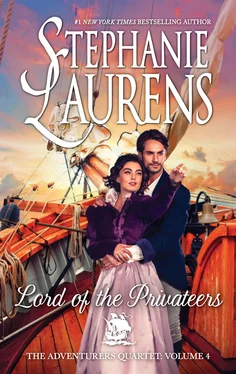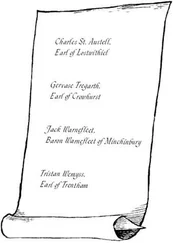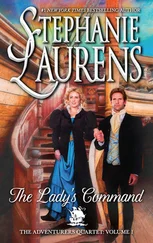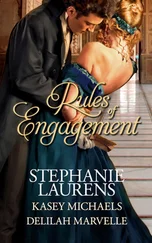In that respect, not much had changed.
But when Royd had hit eleven and his interest in shipbuilding had bloomed, he’d slipped into the shipyards and stumbled—more or less literally—over her.
She’d been a tomboy far more interested in the many and varied skills involved in building ships than in learning her stitches. Although she’d initially viewed Royd’s incursion into her domain with suspicion and a species of scorn—for she’d quickly realized he hadn’t known anywhere near as much as she had—he’d equally quickly realized that, as James Carmichael’s only child, she had the entree into every workshop and vessel in the yards, and no worker would ignore her questions.
Despite the five years that separated them—an age gap that should have prevented any close, long-term association—from that moment, Royd had dogged her footsteps. And once she’d realized that, as the eldest Frobisher brother, he had access to the entire Frobisher fleet, she had dogged his.
From the first, their relationship had been based on mutual advancement—on valuing what the other brought in terms of knowledge and the opportunity to gain more. They’d both been eager to go through the doors the other could prop wide. They’d complemented each other even then; as a team, a pair, they’d enabled each other to intellectually blossom.
They’d encouraged each other, too. In terms of being single-minded, of being driven by their passions, they were much alike.
They still were.
Isobel watched her trunks being ferried aboard and told herself she should follow them. This was what she’d wanted, what was necessary—her traveling with Royd to Freetown so she could fetch Katherine back. That was what was important—her first priority. Her second...
When she’d informed Iona of her intention to ask Royd to take her to Freetown—to browbeat him into it if she had to—Iona had looked at her for several seconds too long for comfort, then humphed and said, “We’ll see.” When she’d returned from Royd’s office and told Iona of her success, her grandmother had scrutinized her even more intently, then said, “As he’s agreed, I suggest you use the hiatus of the journey there and, if necessary, the journey back to settle what’s between you.”
She’d opened her mouth to insist that there was nothing to settle, but Iona had silenced her with an upraised hand.
“You know I’ve never approved of him. He’s ungovernable—a law unto himself and always has been.” Iona had grimaced and clasped her gnarled hands on the head of her cane. “But this state you’re both in—as if a part of your life has been indefinitely suspended—cannot go on. Neither of you have shown the slightest inclination to marry anyone else. For both your sakes, you and he need to settle this before you become too set in your ways—I wouldn’t want that for the Frobishers any more than I would wish it for you. Living your life alone isn’t a state to aspire to. The pair of you, together, need to decide what is and what isn’t, accept that reality, and then move on from there.”
Iona had held her gaze, and Isobel hadn’t been able to argue. Despite settling things between Royd and her being much easier said than done, she had to acknowledge that Iona had it right—for multiple reasons, the current situation couldn’t go on.
But Iona’s reaction to Royd agreeing—and when Isobel had reviewed the exchange, she’d realized he’d agreed without any real fuss—had raised the question of why he had. Did he have some ulterior motive in mind with respect to her? Just because she’d seen no sign of any such ambition on his part didn’t mean it wasn’t there—not with Royd.
She glanced up at the ship, then nodded a dismissal to the waiting footmen, hauled in a breath as if strengthening invisible shields, raised her skirts, and started up the gangplank. She couldn’t understand why Royd hadn’t married someone else; once he did, her way forward would be clear. But he hadn’t, so now she was faced with the necessity of exorcising their past and putting it to rest once and for all.
That was her secondary objective for this trip—to kill off the hopes that haunted her dreams and prove to her inner, still-yearning self that there truly was no hope of any reconciliation between them.
He’d handfasted with her, warmed her and her bed for three weeks, then disappeared on some voyage for the next thirteen months with no word beyond his initial assurance that the trip would take a few months at most.
And then, without warning or explanation, he’d returned.
He’d expected her to welcome him with open arms.
Needless to say, that hadn’t happened—she’d told him she hadn’t wanted to see him again and had shut the door in his too-handsome face.
“Handsome is as handsome does”—one of Iona’s maxims. To Isobel’s mind, she’d lived that, and as witnessed by the past eight years, it hadn’t gone well. But for some godforsaken reason, her fascination with Royd had still not died. She needed to use this journey to convince that naive, yearning self who had once loved him with all her heart that Royd Frobisher was no longer the man of her dreams.
She needed to use this journey to eradicate every last vestige of buried hope.
To extinguish the kernel of her once-great love.
She’d been walking upward with her eyes on the wooden plank. She reached the gap in the ship’s side, raised her head—and looked into Royd’s face. The very same face she would dearly love to strip of its power over her witless senses.
She was a long way from succeeding in that. Her heart performed a silly somersault, and her nerves came alive simply because he was close.
Then he added to her difficulties by extending his hand.
She was quite sure he did it on purpose, to test her. To try, in his usual challenging way, to discover what she intended on the voyage—whether she would insist on the rigid distance she preserved while sailing with him when testing their latest innovation or whether she was going to acknowledge that this voyage was different. That this was personal, not professional.
In for a penny, in for a pound. If she was going to use the journey to resolve what lay between them, she might as well start as she meant to go on.
Steeling her nerves and every one of her senses, she placed her gloved fingers across his palm—and clamped down on her reaction as his fingers closed firmly—possessively—over hers.
“Welcome aboard, Isobel.” Inclining his head, he handed her down to the deck.
He released her, and she could breathe again. She nodded regally. “Again, thank you for agreeing to let me sail with you.” She raised her gaze and met his. “I know you didn’t have to.”
A quirk of his black brows spoke volumes.
“Capt’n—” Royd’s quartermaster, who’d been backing toward them while relaying orders to crew in the rigging, swung around, saw her, grinned, and bobbed his head. “Miss Carmichael. Always a pleasure to have you aboard, miss.”
“Thank you, Williams.” She knew and was known to all of Royd’s crew; all had sailed with him for years. She glanced at Royd. “I’ll get out of your way.”
He waved to the stern deck. “If you want to remain on deck until we’re at sea, you’ll be least in the way up there.”
She assented with a nod and walked to the ladder. Royd followed, but he knew her well enough to allow her to climb unaided; she was more than accustomed to going up and down ladders while wearing skirts.
She felt his gaze on her back until she gained the upper deck. She stepped away from the ladder, then glanced back and down. Royd had already returned to Williams, and they were discussing which sails Royd thought to deploy for sailing out of the harbor.
Читать дальше

![Стефани Лоуренс - Капитан «Корсара» [Lord of the Privateers]](/books/26539/stefani-lourens-kapitan-korsara-lord-of-the-pri-thumb.webp)










